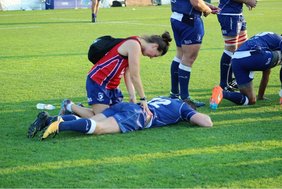1. Avoid a rapid increase in exercise volume, intensity or contact. Start slowly increasing your exercise by going to training and then doing some sort of exercise in your own time – walk, cycle, slow jog, swim x 1 a week. So that you are doing exercise 3-4 x a week. Also as the season approaches during training the coaching staff are going to go through some simple contact drills – looking at positioning and impact.
2. Vary the exercise you do – if you do a lot of cardiovascular/strength/skills work in training, do something different outside of rugby - swimming, yoga, Pilates, core work, simple body weight exercises – chair squats, lunges, hops controlling your landing, step ups in different directions, planks and side planks while moving your arms or legs (very good for mimicking rucks/scrums/tackles).
3. Strengthening a muscle when taking it through its length is far superior to stretching alone. Strengthening-alone has been shown in a systematic review of 26000 participants to be far superior to stretching alone in reducing the risk of 'overuse' injuries by 50% and reduced the risk of acute injuries by 30%.
4. Don't forget to factor in rest days. It takes 48 hours in trained individuals for muscles to recover from a high dose of high intensity exercise and 72 hours for tendons to recover from a dose of high intensity exercise. Studies have shown that those people who have less than 2 rest days per week have a 5x increased risk of overuse injury than those who have 2 or more rest days per week.
5. Set yourself a goal to work on: passing off your left hand, winning a turn over, making your tackles, binding in the scrum, kicking your penalty goals or for territory, etc. and then break it down into measurable aspects and work towards that. Think do I need flexibility, strength, stamina to fulfill that goal.
6. Don't forget to sleep! For all your training to take hold and for your body to adapt to the exercise you are doing your body needs sleep. The recommended amount adults require is 7-9hrs of sleep a night.
Nutrition and keeping hydrated also plays a key role in training but I would suggest you seek help from an expert on this matter. Enjoy!! Remember if you do get injured the quicker we can address the issue the less likely it is going to be a problem that lasts the whole season.
Jenny Lynch Senior Physiotherapist
